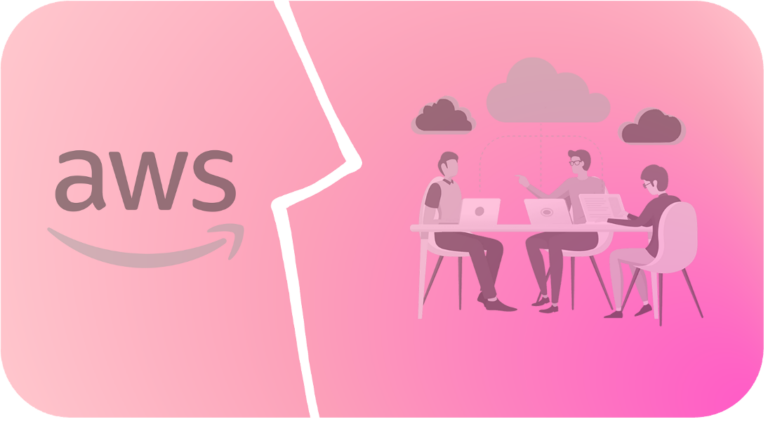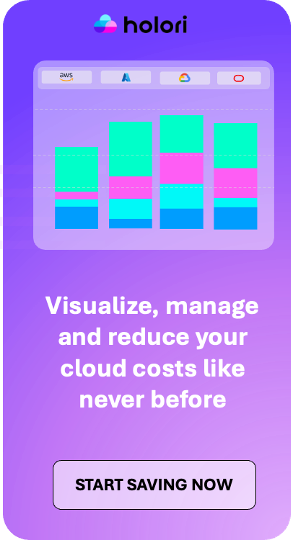The cloud revolution has empowered businesses of all sizes to leverage the power of Amazon Web Services (AWS). However, navigating the complexities of AWS pricing and management can be daunting. This raises the question: should you buy AWS directly from Amazon or through a reseller? Here’s a breakdown of the pros and cons to help you decide:
What is an AWS Reseller?
An AWS reseller is a third-party company authorized by AWS to sell its services. Resellers often bundle AWS offerings with additional services such as consulting, support, and managed services. These resellers can add value by providing expertise, support, and sometimes cost savings through tailored solutions and bulk pricing.
Famous AWS resellers include consulting companies such as CapGemini, Accenture, PWC… and other smaller scale companies such as DoiT, Kuwaitnet…
Benefits of Buying AWS Directly from AWS:
- Full Control and Flexibility: Purchasing directly grants you complete control over your AWS account and resources. You can access all functionalities, manage configurations, and benefit from the latest features without any restrictions imposed by a reseller.
- Direct Access to AWS Support: When you encounter issues, you can contact AWS support directly, leveraging their expertise and troubleshooting resources. This eliminates a middleman and potentially expedites resolution times.
- Potential for Cost Savings: Large organizations with significant AWS spending might qualify for direct negotiations with Amazon for potential discounts or customized enterprise agreements. Resellers may add a markup to their services, impacting your overall cost.
- Access to a Wide Range of AWS Programs: Buying directly ensures access to all programs offered by AWS, including free tiers, credits for startups, and training resources. These programs can be valuable for exploring and optimizing your AWS usage

Drawbacks of Buying AWS Directly from Amazon:
- Management Complexity: Managing an AWS account requires in-house expertise in AWS services, billing, and security. For smaller businesses lacking an experienced cloud team, this can be a significant challenge.
- Limited Support Access: Free AWS support has limitations. For more advanced support options, you might need to subscribe to a paid support plan, adding to the overall cost.
- Paid Plans: AWS offers several paid support plans with varying levels of service and pricing structures:
- Developer Support: This plan has a minimum monthly fee of $29 or 3% of your monthly AWS charges, whichever is higher. It provides basic technical support via email and the AWS forums.
- Business Support: This plan offers a minimum monthly fee of $100 or 10% of your monthly AWS charges for the first $10,000, then 7% for charges between $10,000 and $80,000. It includes phone, email, and chat support with faster response times compared to the Developer plan.
- Enterprise On-Ramp: This plan is designed for larger organizations and requires a minimum monthly fee of $5,500 or 10% of your monthly AWS charges. It offers dedicated account management, proactive support, and access to technical architects.
- Enterprise Support: This is the most comprehensive plan, with a minimum monthly fee of $15,000 or a custom pricing structure based on your specific needs. It provides all the benefits of Enterprise On-Ramp, along with 24/7 support and direct access to AWS engineers.
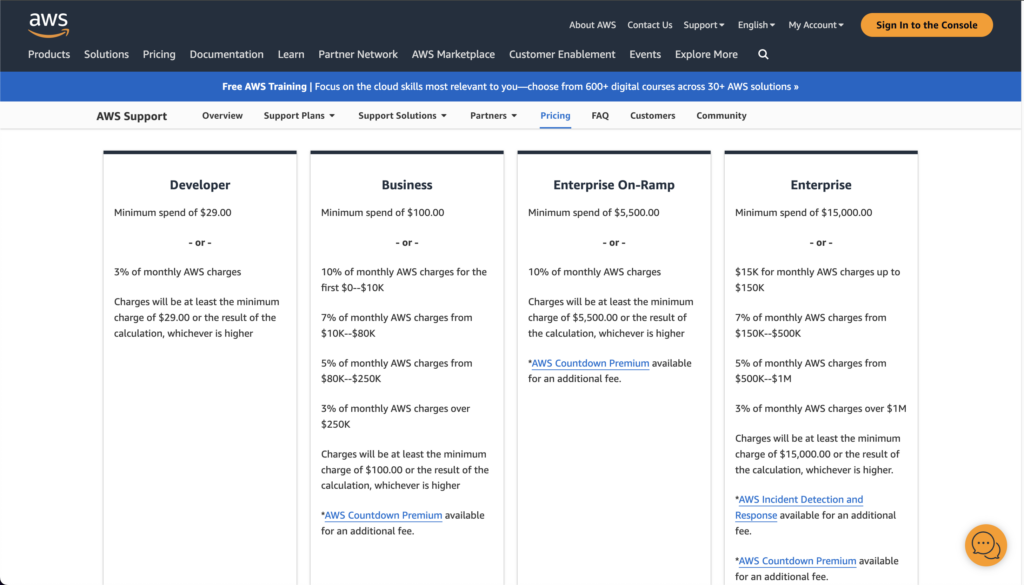
- Hidden Costs: While direct billing removes reseller markups, unforeseen costs can arise from accidental resource overprovisioning or inefficient configurations without proper cost optimization practices.
Benefits of Buying AWS Through a Reseller:
- Tailored Solutions: Resellers often have deep expertise in AWS and can tailor solutions specifically to your business needs. This can be especially beneficial if you lack in-house AWS expertise.
- Simplified Management: Resellers often offer managed AWS services, taking care of account setup, ongoing resource management, and day-to-day tasks. This frees up your internal resources to focus on core business activities.
- Enhanced Support: Many resellers provide dedicated support teams with expertise in AWS, offering more personalized assistance compared to basic AWS support plans.
- Cost Optimization Expertise: Resellers can offer cost optimization services, analyzing your cloud usage and recommending strategies to reduce costs. This can be particularly valuable if you lack internal cloud cost management expertise. Most resellers are using third party Finops platform such as Holori to control and optimize costs of their customers. Sometimes they even build in-house solutions.
- Potential Discounts: Resellers may have negotiated volume discounts with AWS, which they can pass on to their customers. However, this doesn’t guarantee lower costs – be sure to compare the total price with direct purchase options.
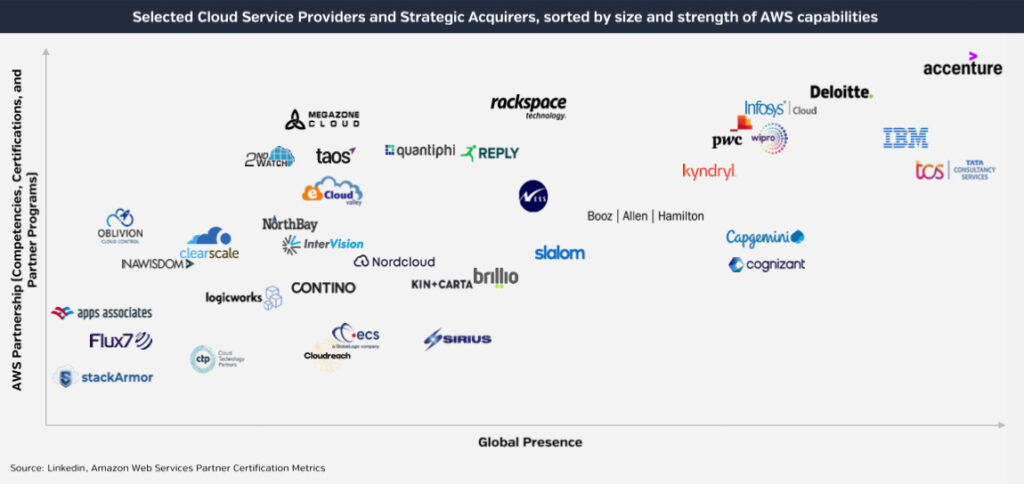
Drawbacks of Buying AWS Through a Reseller:
- Loss of Control: With a reseller, you relinquish some control over your AWS account. Resellers may limit access to certain features or restrict configuration options.
- Vendor Lock-In: Switching from a reseller to direct purchase later might be complex, especially if the reseller has managed your account and configurations.
- Potential for Markup: Resellers might add a markup to their services, increasing your overall cost compared to buying directly from AWS.
- Limited Access to AWS Programs: Some resellers may restrict access to specific AWS programs or limit your eligibility for certain benefits offered directly by Amazon.
How does Resellers makes money
- Committed Use Discounts: Resellers can leverage AWS Committed Use Discounts, similar to Reserved Instances, to secure lower rates for specific services or instance types. These savings can then be reflected in their pricing for end-customers.
- Volume Discounts: As mentioned earlier, resellers can negotiate volume discounts with AWS based on their overall spend. This allows them to offer competitive pricing to their customers.
- Value-Added Services: Resellers can differentiate themselves by offering value-added services on top of AWS products. This could include migration assistance, managed services, or cost optimization solutions.
Can resellers benefit from Enterprise Discounts (EDP)
No, resellers typically do not take advantage of Entreprise Discount Program (EDP) offered by AWS. Here’s why:
- EDP Eligibility: EDP discounts are exclusive to direct AWS customers, typically large enterprises with significant cloud spending commitments. Resellers wouldn’t qualify for these discounts themselves.
- Reseller Pricing: Resellers have their own pricing structure for AWS services. They might negotiate volume discounts with AWS, but these are separate from EDPs. These volume discounts are then factored into the pricing they offer to their end customers.
- Transparency: Resellers are expected to be transparent about their pricing. If they were to receive EDPs, it would be difficult to separate the discounted cost from their own markup, making it challenging to provide clear pricing to their customers.
Selecting the Right AWS Reseller
There is a multitude of resellers in the market, choosing the right partner is crucial. Here’s how the AWS Partner Network (APN) can be a valuable tool in your selection process:

The APN Advantage: A Trusted Ecosystem
The APN isn’t just a directory of resellers; it’s a network of vetted and qualified partners endorsed by AWS. This network offers several benefits that can guide your reseller selection:
- Tiered System: The APN categorizes partners into tiers (Standard, Select, Advanced, Premier) based on their expertise, experience, and commitment to AWS. Higher tiers generally indicate a deeper level of knowledge and more comprehensive service offerings.
- Partner Finder Tool: The APN Partner Finder (https://partners.amazonaws.com/) helps you search for resellers based on location, industry, and solution area. This targeted search allows you to identify partners with expertise relevant to your specific needs.
- Specializations: Many APN partners hold specializations in specific AWS services, industry verticals, or solutions like migration or security. Look for partners with specializations that align with your cloud goals.
At the end of the year, AWS delivers awards to its best partners in different categories. You can find the list of the AWS partners awarded here.
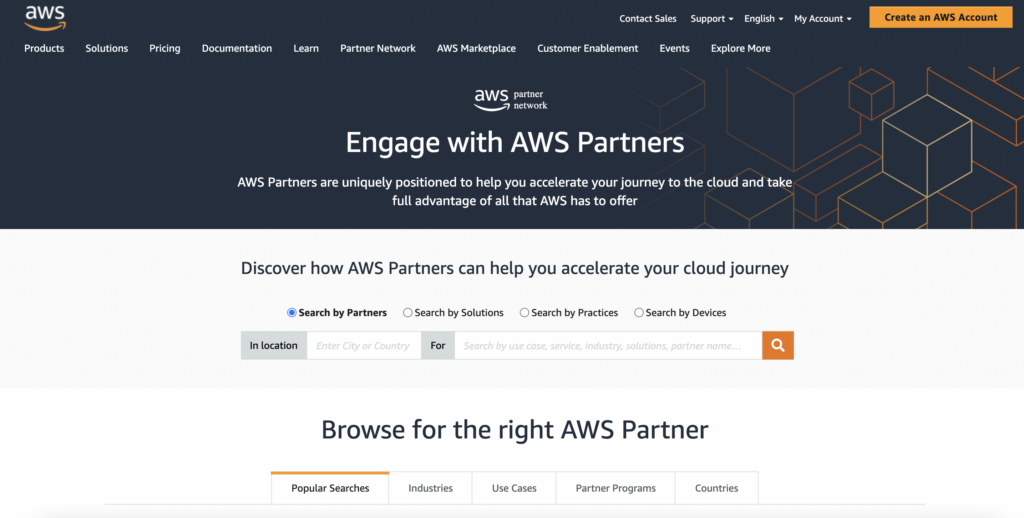
Beyond the APN: Evaluating Reseller Capabilities
While the APN provides a strong foundation, consider these additional factors to select the ideal AWS reseller:
- Expertise and Experience: Ask about the reseller’s team qualifications, certifications, and experience with AWS services relevant to your needs. Look for partners with a proven track record of successful cloud implementations.
- Service Offerings: Identify resellers who offer a comprehensive suite of services beyond just reselling licenses. Look for partners providing migration assistance, managed services, cost optimization solutions, and ongoing support.
- Customer Focus: Choose a reseller who prioritizes understanding your specific business challenges and tailors solutions to address them effectively.
- Communication and Collaboration: Ensure the reseller fosters open communication, actively listens to your needs, and fosters collaboration throughout the cloud journey.
- Pricing and Transparency: Get clear pricing structures and understand any hidden fees. Compare quotes from multiple resellers to ensure you’re receiving a competitive offer.
- Success Stories and Case Studies: Review the reseller’s success stories and case studies to understand how they’ve helped similar businesses achieve their cloud goals. You can find some resellers success stories here
The ideal AWS reseller becomes an extension of your team, guiding you through the complexities of cloud adoption. By leveraging the APN network and considering the additional factors outlined above, you can confidently select a partner with the expertise, experience, and commitment to empowering your success on AWS.
The Verdict: It Depends
Ultimately, the decision to buy AWS directly or through a reseller depends on your specific circumstances. If you have a strong internal cloud team and prioritize control, direct purchase might be ideal. However, for businesses lacking in-house expertise or seeking additional support, a qualified AWS reseller can be a valuable asset. By leveraging the APN network and carefully evaluating potential partners, you can find a reseller who aligns with your needs and empowers you to achieve your cloud goals.
Being cost conscious is very important for any organizations. If you buy from AWS or a reseller you want to track your costs proactively. Holori offers a comprehensive FinOps tool that let you understand and optimize your cloud costs from AWS and other providers.
Try it for free: https://app.holori.com/

